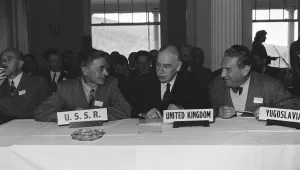International Security is America's leading peer-reviewed journal of security affairs.
Abstract
“Nuclear weapons have come to be defined as abhorrent and unacceptable weapons of mass destruction,” writes Nina Tannenwald of Brown University. The taboo, she argues, has become so widely recognized that the use of nuclear weapons—whether for tactical or strategic purposes—has become “practically unthinkable.” Tannenwald offers a systematic analysis of the development of a nuclear taboo in world politics and U.S. policy. She attributes the growth of the taboo to three factors: a global grassroots antinuclear weapons movement, the role of Cold War power politics, and the ongoing efforts of nonnuclear states to delegitimize nuclear weapons. She closes with some thoughts on ways to further strengthen the taboo, including the creation of a no-first-use agreement and the ratification of a comprehensive nuclear test ban treaty.



